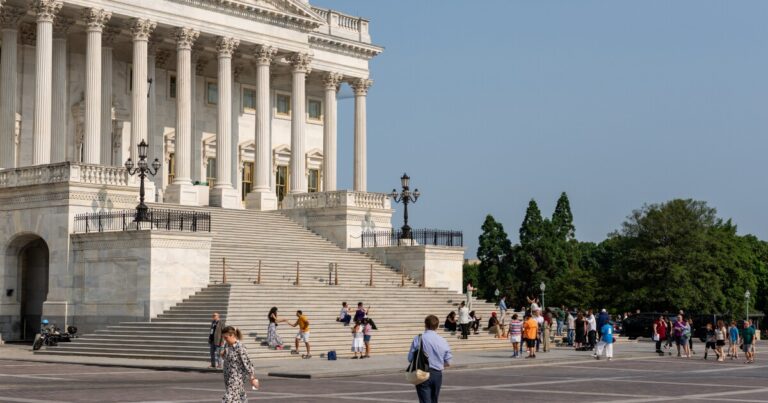President Donald Trump’s tax-and-spending agenda is nearing a climactic vote in the Senate this week in the wake of air strikes on Iran, which risk embroiling the U.S. in a prolonged Middle East conflict.
Trump’s $4.2 trillion tax-cut package, partially offset by social safety-net reductions, does not yet have the support it needs to pass the Senate. Fiscal hawks seeking to lower the bill’s total price tag are at odds with Republicans worried about cuts to Medicaid health coverage for their constituents and phase-outs to green energy incentives that support jobs in their states.
Finessing a deal to line up the votes will require focus — and a bit of arm-twisting — from Trump, who is juggling both a pivotal week for his domestic agenda alongside a highly uncertain situation in Iran following the U.S. strikes.
Trump on Sunday, as U.S. officials and foreign leaders were still digesting what the attacks on Iranian nuclear sites will mean for Middle East stability, urged members of his party to swiftly pass the tax bill.
“Great unity in the Republican Party, perhaps unity like we have never seen before. Now let’s get the Great, Big, Beautiful Bill done. Our Country is doing GREAT,” Trump said on social media.
Senate Republicans plan to begin the multistep process to vote on Trump’s tax and spending cut bill mid-week, setting up final passage in the latter half of the week or over the weekend. That timeline would allow the House to vote on the latest version next week and meet Trump’s goal of enacting his signature bill by July 4.
Meeting that ambitious deadline will require senators to quickly negotiate resolutions to a series of thorny policy issues that have divided Republicans for weeks.
Senate Majority Leader John Thune must balance demands by fiscal conservatives for deeper spending cuts with qualms from moderate Republicans concerned the bill goes too far in making people ineligible for Medicaid and cutting funding for rural hospitals.
Renewable energy incentives continue to divide the party as well, with some conservatives pushing for a faster phase-out of tax breaks for wind, solar, nuclear, geothermal and hydrogen. Other senators are angling to keep the breaks in place for projects that have already begun.
Lisa Murkowski, a GOP holdout in the Senate, told MSNBC on Monday she would prefer to focus on good policy rather than meeting an “arbitrary” deadline.
Florida Republican Byron Donalds, a key Trump ally in the House, also suggested the July 4 date could slip.
“The biggest factor is differences between the House and the Senate,” he said on Fox Business. “We may not hit July 4, but we should be able to do it pretty quickly.”
Senators are in talks with some of their House counterparts over the state and local tax, or SALT, deduction. The Senate bill would keep the current $10,000 cap in place, while the House-passed version would raise it to $40,000.
Several House members from high-tax states, including New York, New Jersey and California, have threatened to block the bill if it doesn’t include a $40,000 SALT cap.
The Senate has some negotiating room to increase the SALT cap. The bill, per Senate rules, can lose up to $1.5 trillion over a decade. But a new estimate from the non-partisan Joint Committee on Taxation, found the legislation only costs $441 billion over 10 years — after deploying a budget gimmick that assumes the $3.8 trillion cost of extending Trump’s first-term tax cuts cost nothing.
Rules battles
Democrats are locked out of the deal-making, with Trump able to pass his agenda on Republican votes alone. But they have been able to use arcane Senate rules to successfully challenge and strike some provisions from the bill if the Senate parliamentarian declares the measures aren’t sufficiently related to taxes, spending or the budget.
The parliamentarian blocked a provision that would make it harder for judges to hold Trump administration officials in contempt for failing to abide by rulings. Democrats were able to eliminate measures that would curb some Supplemental Nutrition Assistance Program benefits. Provisions to strip funding from the Consumer Financial Protection Bureau and cut Federal Reserve employee salaries were also tossed out.
Late Sunday Democrats announced Senate Parliamentarian Elizabeth MacDonough had thrown out provisions related to the federal workforce, including a plan scaling back civil service protections for federal workers and a measure that would allow the president to eliminate agencies without approval from Congress.
She also ruled that a provision forcing the U.S. Postal Service to sell off all its electric vehicles must be removed from the bill. USPS in 2021 inked a $482 million contract with Oshkosh Defense to deliver as many as 165,000 electric vehicles over 10 years.
The parliamentarian has permitted Republicans to use the bill to pressure states not to regulate artificial intelligence by denying them funding for broadband Internet projects. That’s a watered-down version of a House proposal that would have blocked states from issuing AI regulations. That plan drew bipartisan criticism for overstepping states’ authority.
Democrats are also seeking to remove the Section 899 “revenge tax” on companies domiciled in countries with “unfair” tax regimes. That provision has stoked fears on Wall Street of capital flight from the U.S. That parliamentarian ruling could be released as soon as Monday.
The tax bill is the core of Trump’s economic agenda combined into a “big, beautiful bill.” The Senate version makes permanent individual and business tax breaks enacted in 2017, while adding new breaks for tipped and overtime workers, seniors and car-buyers.
The bill would allow hundreds of billions of dollars in new spending for the military, border patrol and immigration enforcement. To partly pay for the revenue losses, the bill imposes new work and cost-sharing requirements for Medicaid and food stamps while cutting aid to students.
The measure would also avert a U.S. payment default as soon as August by raising the debt ceiling by $5 trillion.


